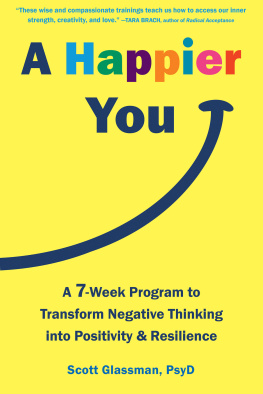Richard K. Caputo,Policy Analysis for Social WorkersMichael Reisch,Social Policy and Social JusticeLisa E. Cox, Carolyn Tice, and Dennis D. Long,Introduction to Social Work: An Advocacy-Based ProfessionMary C. Ruffolo, Brian E. Perron, and Elizabeth Harbeck Voshel,Direct Social Work PracticeUrania E. Glassman,Finding Your Way Through Field Work
Social Work In The New Century
Finding Your Way Through Field Work
A Social Work Students Guide
- URANIA E. GLASSMAN
- Yeshiva University

- Los Angeles
- London
- New Delhi
- Singapore
- Washington DC
Copyright 2016 by SAGE Publications, Inc.
All rights reserved. No part of this book may be reproduced or utilized in any form or by any means, electronic or mechanical, including photocopying, recording, or by any information storage and retrieval system, without permission in writing from the publisher.
FOR INFORMATION:
SAGE Publications, Inc.
2455 Teller Road
Thousand Oaks, California 91320
E-mail: order@sagepub.com
SAGE Publications Ltd.
1 Olivers Yard
55 City Road
London, EC1Y 1SP
United Kingdom
SAGE Publications India Pvt. Ltd.
B 1/I 1 Mohan Cooperative Industrial Area
Mathura Road, New Delhi 110 044
India
SAGE Publications Asia-Pacific Pte. Ltd.
3 Church Street
#1004 Samsung Hub
Singapore 049483
Publisher: Kassie Graves
Editorial Assistant: Carrie Montoya
Production Editor: Kelly DeRosa
Copy Editor: Megan Markanich
Typesetter: Hurix Systems Pvt. Ltd.
Proofreader: Rae-Ann Goodwin
Indexer: Rick Hurd
Cover Designer: Gail Buschman
Marketing Manager: Shari Countryman
Printed in the United States of America
Library of Congress Cataloging-in-Publication Data
Glassman, Urania, author.
Finding your way through social work : a social work student's guide / Urania E. Glassman.
pages cm. (Social work in the new century)
ISBN 978-1-4833-5325-8 (pbk.)
1. Social work education. 2. Social serviceFieldwork. 3. Social servicePractice. I. Title.
HV11.G56 2016
361.307155dc23 2015023617
This book is printed on acid-free paper.
15 16 17 18 19 10 9 8 7 6 5 4 3 2 1
Foreword
As the editor of the SAGE series, Social Work in the New Century, I am delighted to introduce this latest book that focuses on social works signature pedagogy, field education. The series goal is to provide students, faculty, and social work professionals with the theoretical foundation, conceptual tools, knowledge, skills, and ethical principles required for effective practice in todays rapidly changing local, national, and global context. Written with wisdom, insight, and humor by Ronnie Glassman, a leading social work educator, this volume provides expert guidance for undergraduate and graduate students to help them navigate the entire field work process and its many potential pitfalls.
Although field education is widely proclaimed as the most critical component of a social work students training and the development of the professions core practice competencies, it frequently presents the most difficult challenges for students. While many students are well prepared for their academic coursework, they are often less able to handle the complex and ambiguous practice situations with which they are confronted at their internships. Students are placed in circumstances that are outside their previous life and work experiences and are required to work with people whose values, goals, lifestyles, and daily problems are far different from their own. To become effective practitioners, students are compelled to examine their underlying assumptions, resolve tricky ethical dilemmas, learn how to apply broad theories to a specific context, negotiate complicated organizational and community environments, and grapple with what it means to be a professional. Recent demographic changes, increased socioeconomic inequality, and the fiscal impact of policy developments on field agencies have further complicated this complex educational landscape.
In her book, Dr. Glassman skillfully guides students through this landscape. She is sensitive to the issues studentsparticularly beginning studentsface and to the multiple relationships that all students must develop to have a successful field placement experience. Through well-placed, pithy vignettes and case examples, she illustrates how many common student mistakes can be avoided and how inevitable missteps can be corrected. Glassman also distinguishes the specific issues faced by BSW, first-year MSW, and advanced MSW students as well as those that affect students who use their place of employment as an internship. She analyzes the roles of key players in the field education process (field instructor, task supervisor, faculty field liaison) and presents invaluable advice to students on how to maximize the educational opportunities their field agencies provide.
Michael Reisch, PhD, MSW
Daniel Thursz Distinguished Professor of Social Justice
University of Maryland
School of Social Work
Preface
This text is presented to reduce students stress and anxiety as you approach field work in the first and second years of the MSW program, and in senior year of the BSW program. Created from the perspective of a long-standing field director, it aims to achieve smoother field work experiences for student readers. The text gives practical approaches to students for succeeding in field work. It takes students through routes that bypass or navigate the typical obstacles they will meet. By escorting a student through the maze that is field work, the author maximizes a students ability to learn in field work.
Field directors seek to groom students by highlighting favorable and undesirable actions and setting them on the path for maximizing the learning experience in field work. This text provides a field directors insight about students successful and adverse approaches to field work. Its many real-life case illustrations and vignettes shed light on your role as student and the roles of those involved with you in field work. The goal is to prevent the numerous mishaps that occur down the road, which may lead to disruptions in field work or even failures.
Yet this is not a how-to book simply because field work is not prescriptive. The book briefly describes experiential learning models for field work. It includes how to use supervision and coaching from a field instructor. It affirms your development of artistry in using yourself to perform the social worker role rather than to just read about it in a book.
The book is organized in four major parts with several chapters in each.










